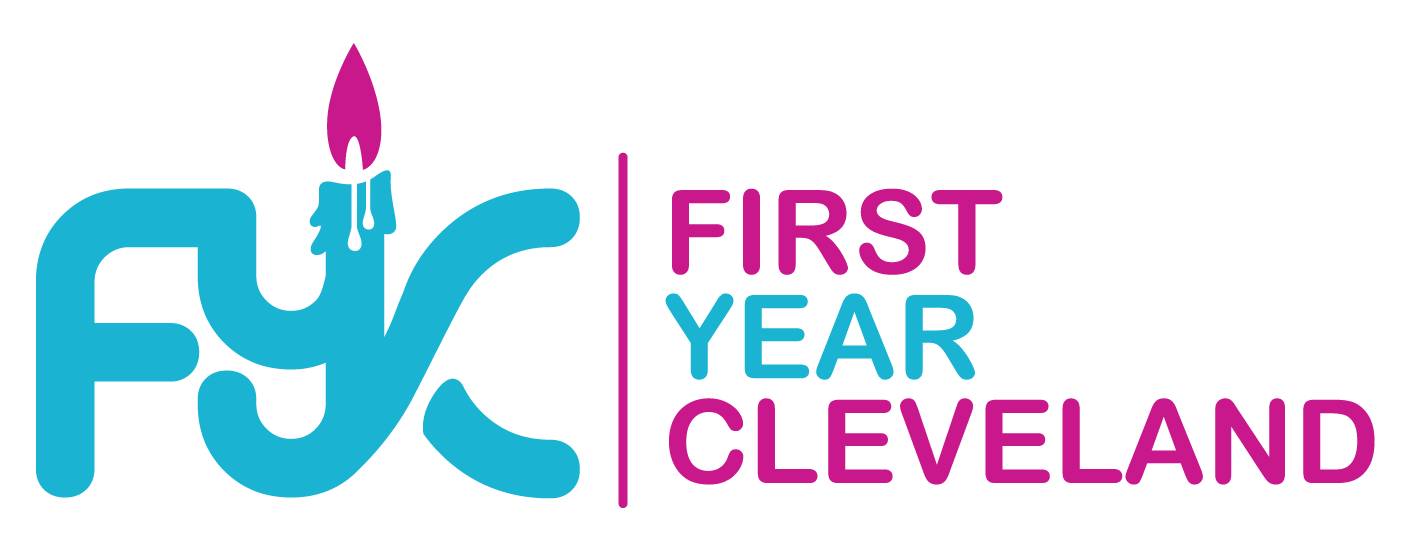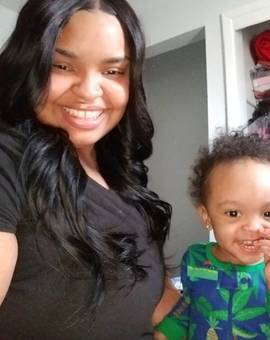Attended Cleveland Clinic Sessions
Son is Abrim Sanders- 18 months
I found out about Centering when I scheduled my first prenatal appointment through Cleveland Clinic’s appointment line. I really liked the idea that it’s an easier way to do appointments in a fun environment, so thought why not give it a shot, and I loved it! I was expecting it to be more like a group meeting, kind of bland or boring, but when I got there it was a really nice, laid-back environment, and everybody was really friendly. It was eye opening about certain things to expect. Everyone made you feel welcome and comfortable. The people there – the other mothers and couples – made me feel really welcome.
I didn’t ask that many questions because I didn’t know what to ask, but other mothers and couples asked questions I didn’t even think to ask. Tony, Fran, and Janet from the Clinic would throw question to the group to consider and discuss too. That was very helpful, hearing all the questions you would want to ask if you thought of them!
Here’s what I tell people about Centering Pregnancy: If you don’t want to go to some boring appointment where you sit most of the time alone and only have a few short minutes with a doctor, and you want to meet other mothers probably going to thorough some of the same things that you are at the moment, and meet some of the people who will be working with you and your child when you’re in labor and the child is born – Centering is perfect! It’s open and conversational, and you are welcome with open arms. And, it’s a lot better and safer than trying to ask advice from people who really don’t have current medical training. Since you gain so much knowledge, I also tell people it’s like parent guiding or a pregnancy knowledge circle. And it’s all explained in easy terms for people who don’t speak in medical terminology.
Once people see the format and what to expect they really like it. It’s a good way to get questions and concerns out like “that’s not what I heard,” or “someone told me this,” and then the Centering facilitators can explain if something isn’t actually true, and correct common myths. There were a lot of things people “heard” and were nervous about but weren’t actually based in reality – so they could breathe a sigh of relief knowing what was true or not and not needing to worry about untrue myths.
You can also meet some of the medical team who might be around during your labor, so you feel more comfortable. The facilitators answer any questions you have. They would also prompt questions about day care, breastfeeding while working, labor techniques and options to explore, normal birthing procedures, what to expect if you need a cesarean section, and walk through different scenarios so you’re prepared.
For example, I think I was less nervous when we took a glucose test that I would have been at a doctor’s office. Even if a glucose test comes back positive, it doesn’t mean your baby will have diabetes which was something people kept (falsely) warning me about. There was also a test after birth where they may keep the baby an additional 24 hours if needed, and it was simply a precaution and won’t harm the baby, so it was a relief knowing more about it. People often shared “scary” birthing stories with me day-to-day that “they heard,” so it was good to hear actual, real expectations and put some of the myths to rest.
I liked hearing the real medical truth and scientific facts versus old wives’ tales and “someone told me” stories that get confusing because they often contradict from one person’s version to the next person’s version. The facts were reassuring and I felt more knowledgeable and clear.
It was good to hear them talk about the safety of knowing better and doing better for things like safe sleep – the chances of a baby dying in their sleep is very slim if the baby is always following ABCDs: Alone, on their Back, in a bare, empty Crib, and Don’t smoke in a home with a baby. Most sleep-related deaths are preventable, accidental suffocations. As long as the baby is Alone – no one else is sleeping with the baby (including no adults, other kids, or pets), no pillows, blankets or stuffed animals are in the sleeping area, the baby is on its Back, in an empty Crib or Pack-N-Play and not on a soft surface (no couches, chairs, or adult beds), and no one smokes in the house or before handling the baby, it is extremely rare for a baby to die in their sleep. Once I heard most sleep-related deaths are preventable by following the ABCDs it made feel a lot better, like one less thing to stress about, since I could help control it and it wasn’t “random.”
Labor is another thing people love to scare you about with horror stories and it really worries you when you’re pregnant. I’m not sure why people like scaring pregnant women but it was so nice to hear real things about different scenarios, like if your baby doesn’t cry when it’s born, don’t be alarmed – that isn’t that uncommon. They explained that newborns commonly only sleep an hour, two, or three at a time and usually eat almost that often, sometimes more and sometimes less, so it’s typically normal and nothing to worry about. They also usually cry for several hours a day total. (Asking if a newborn baby sleeps through the night is like asking if the newborn can read – it isn’t even supposed to!)
People without medical degrees sometimes have the information way wrong although they are trying to be helpful. Scientific understanding and medicine changes fast so even experiences or recommendations from a few years ago could be much different today than they were then.
On top of feeling empowered with knowledge, Centering is a fun, easy way to meet other moms, often with other children, and it really helps being around the happiness and love and support of a group.

